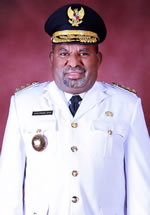Fishing Port Will Produce Regional Income If Handed over to The Province
Acting Head of Papua Marine and Fisheries Department, Iman Djuniawal ensures that eight Fishing Ports that are now managed by districts and cities, will generate significant Regional Original Income (PAD), if handed over to the provincial government.
It was said Iman, to reporters, Monday (08/16/2021), in Jayapura, responding to the reluctance of the district and city governments, handing over fishery port assets to the provincial government, as mandated by Law 23 2014 on Local Government, which has implications for the transfer of personnel, funding, facilities and infrastructure, as well as documents (P3D).
"Hand it over to us (in the province) and then we make regulations because if it is not submitted then it cannot be districts and cities make regulations for public services. The authority of the law must be from the province but manage it together."
"The regulations will be made because there will be a lot of income there. For example, the cost of moored and anchored, loading dock, parking space, land rent and it goes into regional income. But it must be made by the province, "explained.
He explained, currently Papua Province has eight Fishing Ports that have not operated optimally to attract regional income for their respective regions.
The eight ports are in Jayapura City, Jayapura Regency, Merauke, Asmat, Mappi, Mimika, Nabire, Waropen and Biak.
Of the eight areas, it is said that only the Mimika Regional Government has now prepared to hand over the assets of the Fishing Port located in Pomako, Timika. However, his status has not been officially transferred because it awaits the administrative settlement which is now being submitted to the relevant ministry.
"Therefore, we call for cooperation from the local government. There are many positive impacts that can be driven by the management of the Fishing Port."
"If all areas have functioned the Fishing Port properly, it can encourage fish exports. And indeed this is our homework to make it happen, and once again it needs collaboration from all relevant parties, both in provinces, districts / cities and central government," he concluded.



.jpeg)



